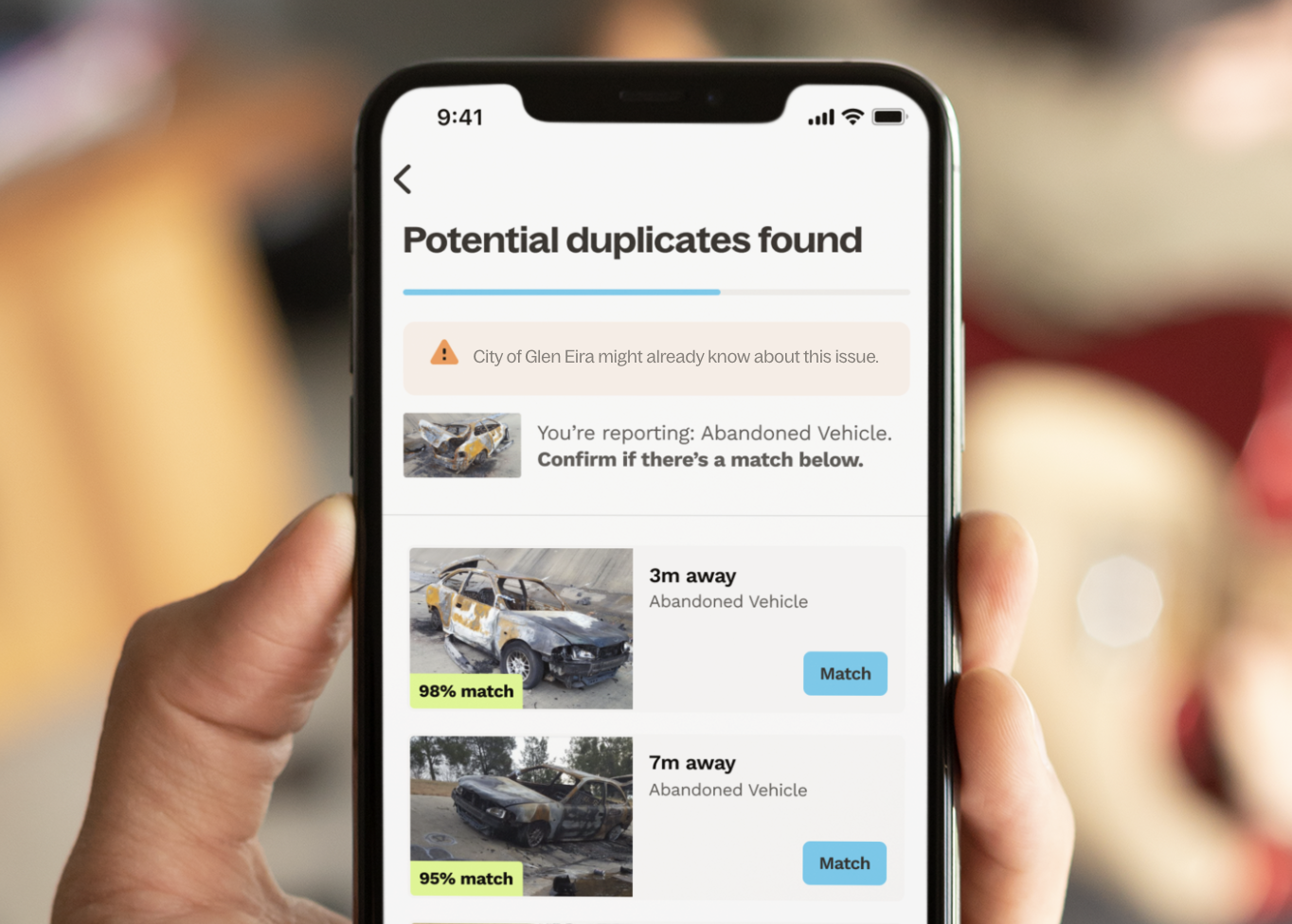How City of Glen Eira expects to save $88k per year with Duplicate Detection

In June 2025, the Glen Eira City Council activated Snap Send Solve’s AI-powered Duplicate Detection feature to address a growing inefficiency in its customer service operations. With thousands of service requests coming through each month, duplicated reports were creating unnecessary work for council staff and generating inflated data in internal reports. In just six weeks, the implementation demonstrated clear benefits across staff time, operational cost savings, and improved service transparency.
Duplicated Effort, Diminished Impact.
“For each potential duplicate, someone has to check the location data, timestamps, photos, and request details before determining if it’s already been actioned. Multiply that across hundreds of requests, and it’s a major burden.” — Kiran Nagra
Glen Eira City Council operates a centralised customer experience model, handling all service requests, whether submitted online, by phone, or in person, through a single team. This team manages up to 25,000 enquiries each month, including 1,500 to 2,000 via the Snap Send Solve platform. As Snap Send Solve has grown in popularity, it has also brought a rise in duplicate reports, often, multiple residents unknowingly report the same problem across different channels, leading to duplicate entries in the system.
“We received 34 reports about one water fountain outage in a few hours. Every one had to be triaged and responded to individually.”— Kiran Nagra
How Duplicate Detection Changed the Game.
.png)
Glen Eira City Council implemented Snap Send Solve’s Duplicate Detection System on 9 June 2025. The solution identifies potential duplicate reports in real time and prompts residents to confirm if the issue has already been reported before submitting.
The AI model compares reports by:
- Photo similarity
- Location proximity
- Incident category
- Timestamp
- Issue description
When a match is confirmed, the system:
- Prevents new reports from being created
- Displays resident interest to council without duplicating the job
Their residents can follow existing reports for updates instead of creating a new request.
“While our team works hard to manage it, without automation we’re constantly playing catch-up. This solution changes that.” — Kiran Nagra
Money Saved, Minutes Recovered.
Since activating duplicate detection in June 2025, Glen Eira has already seen measurable improvements in time efficiency, cost savings, and operational effectiveness.
In just six weeks, the system identified 79 duplicate reports. Previously, each duplicate took approximately 6.5 minutes to assess and resolve manually. By automating this process, the team saved nearly 9 staff hours, equivalent to a full working day. This translates to a labour cost saving of $327.25, meaning staff can redirect their efforts toward more complex, high-impact tasks instead of repetitive manual data entry.
The Duplicate Detection System also prevented 77 unnecessary field team call-outs, saving time, fuel, and coordination effort. The total estimated operational cost savings from avoiding these duplicate dispatches is $5,360.
Additionally, contractor expenses were reduced thanks to the system's ability to intercept jobs before they were allocated. Between May and the end of June, 45 duplicate dumped rubbish requests were prevented from reaching external contractors. At an average cost of $100 per job, this avoided $4,500 in unnecessary contractor fees.
Based on the data from the six-week trial period, Glen Eira could expect to save approximately $88,324 per year by using the Duplicate Detection System. These savings come from reduced labour costs, avoided operational expenses from unnecessary field dispatches, and lowered contractor fees.
Beyond dollars and hours, the duplicate detection feature also improved community-facing outcomes. With less duplication, customer service teams can triage and respond faster, and residents are less likely to grow frustrated waiting for a response to an already-reported issue. This has led to a noticeable reduction in escalations to elected officials, particularly for common concerns like dumped rubbish.
Internally, the team is also projecting a 10% reduction in call volume, thanks to more issues being handled seamlessly through digital channels. While full analysis is pending, the early signs suggest a meaningful channel shift is underway.
“It’s not just data hygiene, it’s smarter operations, better decision-making, and a smoother experience for residents.” — Kiran Nagra





Stay in the loop with insights that matter
Sign up for exclusive research, industry insights, and updates tailored for Solvers on the Snap Send Solve platform.



.png)


.png)